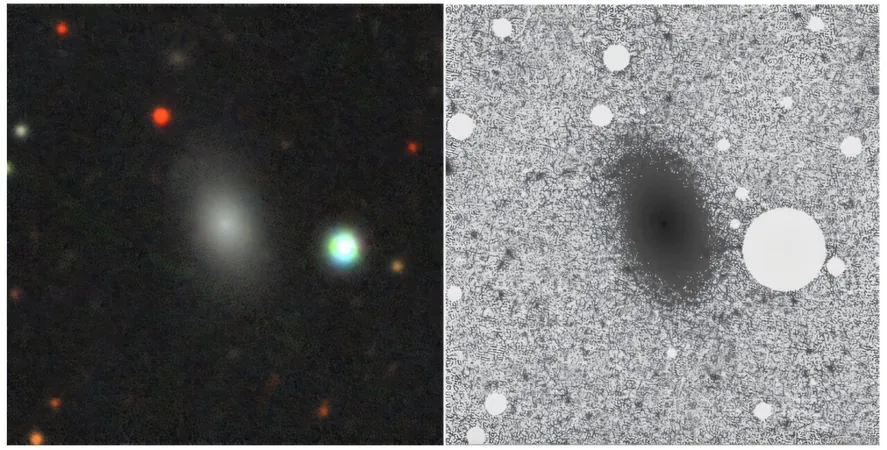
Astronomers Uncover a Unique 'Runaway' Dwarf Galaxy!
2025-09-04
Author: Nur
A Stunning Discovery in the Cosmos
In an exciting revelation, astronomers from Yonsei University in Seoul, South Korea, have discovered a fascinating new isolated early-type dwarf galaxy that seems to have escaped its cosmic neighborhood. This groundbreaking finding, highlighted in a paper published on August 28, is stirring up discussions about the origins of these elusive galaxies.
What Are Early-Type Dwarf Galaxies?
Dwarf galaxies, characterized by their low luminosity and mass, typically house billions of stars. Among them, early-type dwarf galaxies (dEs) are particularly prevalent in nearby clusters and groups. Recent discoveries of isolated dEs—galaxies that exist alone rather than within a cluster—have sparked renewed intrigue regarding their formation and evolution.
A 'Runaway' Galaxy?
The research team, led by astronomer Sanjaya Paudel, has identified a galaxy named SDSS J011754.86+095819.0, or dE01+09, which appears to have a remarkable backstory. By meticulously analyzing data from various surveys, including the renowned Sloan Digital Sky Survey, the team determined that dE01+09 is situated a staggering 3.9 million light-years away from its presumed host group, NGC 524.
Details on dE01+09!
Current observations reveal that dE01+09 resides in a nearly isolated region, demonstrating the hallmark traits of a dE: a uniform stellar population and no recent star formation activity. This intriguing galaxy boasts an effective radius of about 3,900 light years and a mass of 280 million solar masses. Estimated to be 8.3 billion years old, its metallicity is measured at -1.19 dex.
The Rise and Escape of dE01+09
Astrophysicists hypothesize that dE01+09 was once part of the NGC 524 group but was ejected during dynamic interactions after several billion years of existence. Initially a star-forming dwarf, it likely faced environmental changes that halted its star production. Eventually, around 3.5 billion years ago, a significant gravitational encounter propelled it to escape velocity, casting it out into isolation.
Why This Discovery Matters
The presence of a quiescent dwarf galaxy like dE01+09 in such a solitary environment is a rarity in the universe. The researchers stress that further investigation into dE01+09 could shed light on the enigmatic characteristics of these rare dwarf galaxies, offering deeper insights into the evolution of the cosmos.


 Brasil (PT)
Brasil (PT)
 Canada (EN)
Canada (EN)
 Chile (ES)
Chile (ES)
 Česko (CS)
Česko (CS)
 대한민국 (KO)
대한민국 (KO)
 España (ES)
España (ES)
 France (FR)
France (FR)
 Hong Kong (EN)
Hong Kong (EN)
 Italia (IT)
Italia (IT)
 日本 (JA)
日本 (JA)
 Magyarország (HU)
Magyarország (HU)
 Norge (NO)
Norge (NO)
 Polska (PL)
Polska (PL)
 Schweiz (DE)
Schweiz (DE)
 Singapore (EN)
Singapore (EN)
 Sverige (SV)
Sverige (SV)
 Suomi (FI)
Suomi (FI)
 Türkiye (TR)
Türkiye (TR)
 الإمارات العربية المتحدة (AR)
الإمارات العربية المتحدة (AR)